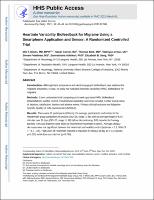Please use this identifier to cite or link to this item:
https://hdl.handle.net/20.500.12202/9410| Title: | Heartrate variability biofeedback for migraine using a smartphone application and sensor: A randomized controlled trial |
| Authors: | Minen, Mia T. Corner, Sarah Berk, Thomas Levitan, Valeriya Friedman, Steven Adhikari, Samrachana 0000-0002-8938-4949 |
| Keywords: | migraines heartrate app-based HRV biofeedback (HeartMath) electromyograph biofeedback Migraine-Specific Quality of Life Questionnaire (MSQv2) |
| Issue Date: | 2021 |
| Publisher: | Elsevier |
| Citation: | Minen, M. T., Corner, S., Berk, T., Levitan, V., Friedman, S., Adhikari, S., & Seng, E. B. (2021). Heartrate variability biofeedback for migraine using a smartphone application and sensor: A randomized controlled trial. General Hospital Psychiatry, 69, 41–49. https://doi.org/10.1016/j.genhosppsych.2020.12.008 |
| Series/Report no.: | General Hospital Psychiatry;69 |
| Abstract: | Introduction Although hand temperature and electromyograph biofeedback have evidence for migraine prevention, to date, no study has evaluated heartrate variability (HRV) biofeedback for migraine. Methods 2-arm randomized trial comparing an 8-week app-based HRV biofeedback (HeartMath) to waitlist control. Feasibility/acceptability outcomes included number and duration of sessions, satisfaction, barriers and adverse events. Primary clinical outcome was Migraine-Specific Quality of Life Questionnaire (MSQv2). Results There were 52 participants (26/arm). On average, participants randomized to the Hearthmath group completed 29 sessions (SD = 29, range: 2–86) with an average length of 6:43 min over 36 days (SD = 27, range: 0, 88) before discontinuing. 9/29 reported technology barriers. 43% said that they were likely to recommend Heartmath to others. Average MSQv2 decreases were not significant between the Heartmath and waitlist control (estimate = 0.3, 95% CI = −3.1 - 3.6). High users of Heartmath reported a reduction in MSQv2 at day 30 (−12.3 points, p = 0.010) while low users did not (p = 0.765). Discussion App-based HRV biofeedback was feasible and acceptable on a time-limited basis for people with migraine. Changes in the primary clinical outcome did not differ between biofeedback and control; however, high users of the app reported more benefit than low users. |
| Description: | Scholarly article / Open access |
| URI: | https://www.ncbi.nlm.nih.gov/pmc/articles/PMC8721520/ https://hdl.handle.net/20.500.12202/9410 |
| ISSN: | 0163-8343, 1873-7714 |
| Appears in Collections: | Ferkauf Graduate School of Psychology: Faculty Publications |
Files in This Item:
| File | Description | Size | Format | |
|---|---|---|---|---|
| Seng 021 OA Heartrate variability nihms-1753933.pdf | 544.8 kB | Adobe PDF |  View/Open |
This item is licensed under a Creative Commons License

